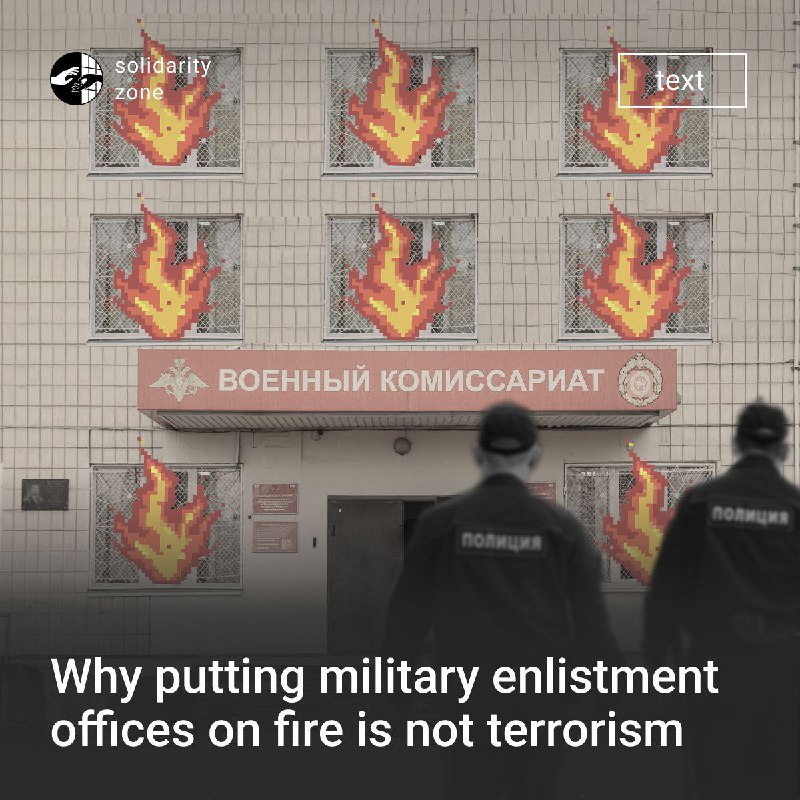group-telegram.com/solidarity_zone/534
Last Update:
Why putting military enlistment offices on fire is not terrorism
There are many definitions of "terrorism" in the world, but in the context of political persecution in Russia, we are primarily interested in the definition of the Criminal Code of the Russian Federation.
Article 205 of the Criminal Code of the Russian Federation "Terrorist act": "Committing an explosion, arson or other actions that frighten the population and create the danger of death, causing significant property damage or other grave consequences, in order to destabilize the activities of government bodies or international organizations or influence their adoption decisions, as well as the threat of committing these actions in order to influence decision-making by authorities or international organizations".
At first, everything seems to match. Arson at the recruiting office is arson. But the method of action is not the main qualifying feature of "terrorism": in theory and practice, people in Russia are convicted of arson under articles on "damage or destruction of property" (Article 167 of the Criminal Code of the Russian Federation) and "hooliganism" (Article 213 of the Criminal Code of the Russian Federation) and even under the administrative article (punishment up to 15 days) "Petty hooliganism" (Article 20.1 of the Code of Administrative Offenses).
Mandatory and one of the main qualifying features of "terrorism" is "intimidation of the population". Is it possible to talk about "intimidation of the population" when military enlistment offices are set on fire? We think the answer is "No". People are intimidated by war, forced mobilization, fear of the death of loved ones, but not arson of military registration and enlistment offices. In the reactions and comments of people, we see any kind of reactions — from support to hatred for the "enemies of Russia" — but not fear.
Another important qualifying feature is closely connected with "intimidation of the population" — "creation of the danger of human death". We will not fantasize and just take the statistics: at the end of December 2022, according to Mediazona's calculations, 77 anti-war arsons were committed — in no case was anyone injured.
On other signs — for example, the "goal to destabilize the activities" of the military registration and enlistment office — in some cases, one can speak positively. But without other components of the "terrorist act" — primarily "intimidation of the population" — the arson of the military registration and enlistment office will not be such.
Solidarity Zone believes that all known arsons of military enlistment offices in Russia that were committed in 2022-2023 are not "terrorist acts". The persecution of people under this particularly grave article is politically motivated and is directly related to the fact that the russian government unleashed an aggressive war against Ukraine.
We call on everyone — human rights defenders, activists, the journalistic community and all concerned people — to pay attention to the criminal cases of arson of military registration and enlistment offices, which were qualified as "terrorism". These people should not sit those huge terms of imprisonment that they are assigned, but right now they need support and recognition as political prisoners.
Solidarity Zone highlights "terrorism" cases related to anti-war arson and provides direct support to a number of prisoners.
#english
BY Зона солидарности

Share with your friend now:
group-telegram.com/solidarity_zone/534
